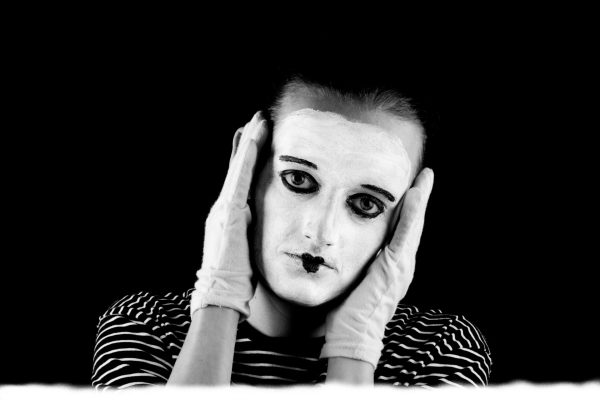It’s All In My Head

26 September 2019 | Theme: Quiet | 9-Minute Read | Listen
This month we’ve been focusing on quiet—the need for quiet space to recover from stress, the quiet of an empty nest, the lack of quiet in public spaces.
For me, though, there is absolutely never, ever true silence, because there is always noise in my head. I am one of the estimated 50 million Americans who suffer from tinnitus, a constant ringing or buzzing in the ear.
I first discovered my tinnitus when I was in college and a friend told me he’d just come from the on-campus hearing clinic to find out what was causing the ringing in his ears. I looked at him in disbelief and said, “You mean everyone doesn’t hear that?” I seriously thought that the ringing I always heard was normal! I couldn’t even remember a time when I hadn’t heard the high pitch inside my head, and of course, I assumed it sounded like that inside everyone’s head. I scheduled my own appointment at the clinic and was diagnosed with a mild to moderate high-frequency sensorineural hearing loss. The doctor gave me some literature to read—one was titled “I Am Joe’s Ear”—and I left, stunned, then cried the whole way home.
Since most people have experienced at least some short-term ringing in their ears, you probably have an idea what it sounds like. But unless you also live with it daily, you may be unaware of its impact. For me, it’s a high-pitched ringing in both ears that never lets up. My left ear is slightly worse than my right, and the pitches in the two ears are slightly different—a discord. I am able to tune it out much of the time, but that requires that I devote part of my energy to do so. It makes sense, then, that when I am tired or stressed, it sounds louder. And if I forget to protect my ears from loud sounds, the ringing can be intensified for several days.
I am also hypersensitive to changes in air pressure: if a single window in the back of the car is rolled down, I hear a percussive “fub, fub” in both ears that is physically painful. Opening an additional window or the sun roof seems to help equalize the pressure, and the fub-fubbing is reduced. Altitude changes or pressurized rooms can cause me to feel panicked until I can clear my ears. When I listen to a piano being played, I can’t hear the highest note, C8, but instead hear the plunk of the hammer on the strings. And at concerts and Broadway shows, I am constantly removing my musician earplugs to hear the quieter passages, then inserting them quickly in anticipation of louder passages or applause.
Tinnitus is most often caused by hearing loss, and according to Julia Belluz, hearing loss is now the third most common chronic health condition, just behind cancer and diabetes. Much hearing loss is caused by exposure to loud sounds (noise-induced hearing loss, or NIHL). Belluz spoke with audiologist Ellen Pfeffer LaFargue of the Center for Hearing and Communication in New York. LaFargue gave a simple explanation of hearing loss: inside the ear are tiny hairs that move when stimulated by sound waves and then transmit information to the brain. Think of the hairs as blades of grass. You can walk across the grass once and it will soon recover—you’ll see your path for a little while, but the bent blades of grass soon bounce back. But if you walk across the same path many times, the blades of grass break and die. Similarly, when loud sounds have passed through our ears enough times—or a single sound, like a gunshot, is intense enough—the hair cells die, and they can no longer transmit information to the brain.
Audiologist Brenda Alred explained to me that the brain is constantly looking for information from those hair cells, and when it doesn’t receive a signal, the brain becomes over-vigilant and amps up its perception of sound, resulting in what we call tinnitus. For many people, it’s a high-pitched whining or ringing like what I hear. But it can also be a buzzing, beating, whooshing, roaring, crickets, static, or even sound like music or a human voice. You can hear some simulations of tinnitus that The Tinnitus Clinic in the UK has posted online.
Hearing loss can come on gradually, without the sufferer being aware of it at first. Imagine a whiteboard with a poem written on it, and someone comes along and passes an eraser over the board once. You can probably still read enough of the poem to figure out the missing parts. At first, you don’t even realize that you’re filling in the missing letters. But as they pass that eraser over it again and again, you have to use more and more time and energy to figure out the words, and you begin to make wrong guesses as you supply increasing amounts of information. That’s what hearing loss can be like. If there’s a lot of background noise, it’s even harder to discern the other person’s speech. You lean forward, try to lipread, and as a last resort, ask the other person to repeat.
As with all topics on DoYouMind, I am most interested in what tinnitus, as well as hearing loss, means and how we relate to it. When I was diagnosed in my 20’s, I cried all the way home because I felt that my ears were defective, not enough (and we’ll be rumbling with “Enoughness” in October). Now in my fifties, I have lost sufficient hearing to miss out sometimes on the distinct sounds of speech, which feels frustrating. A couple of years ago, I was fitted for hearing aids, but I felt some shame in telling people, even my family, about my hearing loss. Greg Scott*, creator of the SoundPrint app, says that many people have a hard time telling others about their hearing loss, so I suppose I’m in good company.
Hearing loss can be extremely isolating, and it’s fatiguing. It takes tremendous mental energy to be in conversation, especially in noisy environments. When the other person becomes frustrated by having to repeat, it’s hurtful. I didn’t choose to have hearing loss, and the other person has no idea how hard I’m working to be in the conversation. Hearing loss isn’t a character flaw. But when talking with someone becomes difficult, honestly, it’s tempting sometimes just to give up. And I see that in older adults, especially some I’ve known who were in nursing homes. Nurses and staff have assumed that their mental capacity was deteriorating, when in reality, they simply couldn’t hear well. That must make them feel isolated and lonely. According to Dr. Alred, depression, stress, and anxiety can indeed result from tinnitus.
Dr. Alred gave me some pointers for people who have hearing loss and tinnitus. The first step is to have a thorough examination and hearing test to rule out other health concerns. Many modern hearing aids are programmable with “white noise” that can reduce the effects of tinnitus. The hearing aids can also be programmed for noisy environments such as restaurants; they pick up the sound of the person in front of the wearer rather than the ambient sounds of the café. Choosing good lighting will help with lip-reading, which we all do subconsciously. Greg Scott suggests looking for places with tablecloths, upholstered chairs, plants, and drapes—anything that absorbs sound. I have found that a booth is often better than a table in the middle of a crowded restaurant.
If you’re in relationship to someone with hearing loss—and with an estimated one in four adults showing signs of hearing loss, you are—you can take steps to aid in communication. First of all, look at the person. It seems such a simple thing, but eye contact tells the other person that you are interested in communicating, that you want to understand and be understood. Keep your face visible—eating, smoking, chewing, or covering the face makes it difficult for a hearing-impaired person to speech read. A pet peeve of mine is people who walk away, or even into another room, as they are talking “at” me. Just—don’t.
Next, minimize background noise when possible. Find quiet, well-lit spaces to talk when possible. Silence your phone. That seemingly tiny beeping or chirping may seem distorted to a hearing-impaired person, and may even be physically painful.
Also, if you know that the person has one “better” ear, make a point of remembering which is the better side and position yourself accordingly.
Finally, have patience. Slow your speech down a bit, but don’t exaggerate your mouth movements or shout. Use distinct consonant sounds, and pause at the end of sentences to make sure you’re understood. Pay attention to facial cues from the listener that may indicate confusion. Be willing to repeat if necessary.
October is National Protect Your Hearing Month, and you can learn more at the NIDCD (National Institute on Deafness and Other Communication Disorders) website. I encourage you, Dear Reader, to learn more about noise-induced hearing loss and how you can prevent it.
Until next time,

*Greg is a private person who keeps his online identity separate from his personal identity. He uses the alias Greg Scott.
Resources:
Alred, Brenda, Au.D. Personal interview. 22 September 2019.
Belluz, Julia. “Restaurants Are Too Freaking Loud. This App Helps You Shame Them.” Vox, 22 April 2019. https://www.vox.com/science-and-health/2018/4/26/17275406/restaurant-noise-app
Belluz, Julia. “The Noise All Around Us That’s Destroying Our Hearing, Explained.” Vox, 4 June 2018.
https://www.vox.com/2018/5/9/17280992/noise-hearing-loss-tinnitus
“Communicating With People With Hearing Loss.” UCSF Health. N.d. https://www.ucsfhealth.org/education/communicating_with_people_with_hearing_loss/
“October Is National Protect Your Hearing Month.” NIDCD, 26 September 2018. https://www.nidcd.nih.gov/news/2018/october-is-npyhm
“What Does Tinnitus Sound Like?” The Tinnitus Clinic. N.d. https://www.thetinnitusclinic.co.uk/about-tinnitus/tinnitus-sounds
If you enjoyed this article,
please share on social media!
NEXT ARTICLE

A Conversation With… Anna Veronesi
29 September 2019 | Theme: Quiet | 1-Minute Read
My guest for the theme of “Quiet” is Anna Veronesi. Anna has been a healing arts practitioner for over 20 years and is an acupuncturist, massage, cranial sacral, and biomagnetic pair therapist. As a mother of two, she is a single . . .